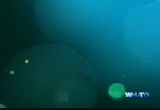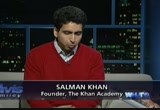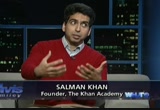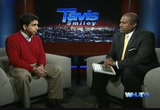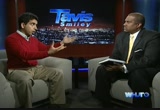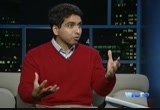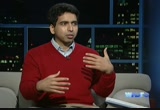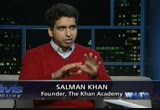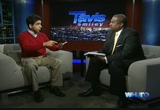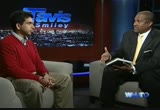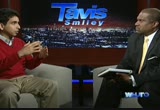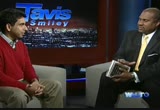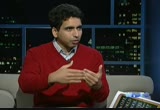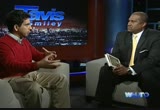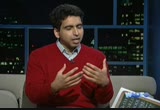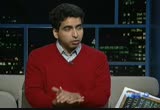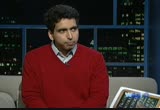tv Tavis Smiley WHUT October 29, 2012 7:00pm-7:30pm EDT
7:00 pm
tonight a conversation with salman khan. he is part of the national conversation about how we improve schools. his goal of providing a free world-class education to anyone, anywhere, is ambitious, to be sure. his success has landed him on the top 100 list can receive approval from the gates foundation. our conversation with salman khan, coming up right now. >> there is a saying that dr. king had that said there is always the right time to do the right thing. i try to live my life every day by doing the right thing. we know that we are only halfway to completely eliminating hunger and we have work to do. walmart committed $2 billion to fighting hunger in the u.s. as we work together, we can stamp hunger out. >> and by contributions to your
7:01 pm
pbs station from viewers like you. thank you. tavis: if you think they are not any big ideas out there, salman khan is a man with a big idea. he founded the free nonprofit khan academy to provide free education to anyone, anywhere. he has delivered more than 45 million lessons today. salman khan, good to have you on this program today. when you say the one world schoolhouse, what do you mean by that? >> it was intentionally in
7:02 pm
chosen to be interpreted a couple of different ways. it is kind of a play on words, to harken back to the one-room schoolhouse where you have the students all helping each other, more time with the teacher. tavis: for those who are not yet familiar with your work, tell me how the khan academy works. >> it is most known for a collection of videos that i started making for my cousin. there are now over 3000 of them, everything from basic arithmetic all the way to college level calculus or biology or chemistry. a lot of students are using it as a supplement. if you are having trouble with something, it is like a free to. -- like a free tutor. we have a lot of people working
7:03 pm
on interactive software. you can get feedback, get practice problems. video is a part of it, but we are going to le'ron interactivity. tavis: i get the sense in reading your work over the years that you are saying technology humanizes classrooms. if i am right about that, tell me why you believe that. >> when people talk about technology or virtual anything, they always imagine that somehow replacing a physical -- like amazon.com versus barnes and vulcans orlike the balkan tyhe borg in star trek. we are seeing in classrooms that technology is not used to demonize the classroom, but to go the other way. we are all sitting there physically with each other but
7:04 pm
not interacting. we are staring at the chalkboard and one person is lecturing. one student might be bored and one might be lost. the teacher is not getting a lot of feedback. we are saying let's use technology to take some of that off the teachers table so is not about eight lector anymore. it should be about interacting with your friends and the teacher and doing problem- solving. when i was in school, if a friend is having trouble with something and you whispered, you should look at it this way, you should -- you would get reprimanded. why are you talking? they should be working with each other and with the teacher. tavis: if you went to the department of education right now and walked into arne duncan office and he could show you on the wall a map where the 2000 worst schools in the country are -- they know where they are. have them on a map and they can identify those schools.
7:05 pm
tell me how your approach to education, your idea of education levels the playing field for poor kids who are stuck in those schools. we know where the schools are. how does your approach to level the playing field work in those schools? >> we work with those schools and others. you see this even more in underserved neighborhoods. in the traditional model, students keep getting promoted. your in the second grading you did not learn the multiplication tables, you get progressed. in underserved areas, the kids show up in what is supposed to be an algebra class and they never learned multiplication. even its the kids are amazingly smart and hard-working and have a great teacher, and they do not
7:06 pm
always have the resources, there is no way to get past that disconnect. we are saying, let's empower the teacher to be able to differentiate this instruction across the students. we saw in the data, in a traditional boundaries set up, the teacher would just have to march the students along and pretend to do algebra even if some of them did not understand the basic ideas. now they can go back and learn at their own pace and build stronger foundation. when you allow students that you thought were slow are not able to get ideas, if you let them do the remedial class, they can race ahead. the problem is simply these hard gaps to get over. it seems pretty universal.
7:07 pm
tavis: taken inside the text of the one world school house and give me a few ideas for how we advance in education. >> right now all of the education debate or reform it is all about singapore, they are better at factoring polynomial. look at the last 10, 20, 30, 50 years. look at the last 10 really innovative companies, they were all american companies. the whole principle is, let's not make our model war like the model in singapore, let's make it more american. these are american schools, we need an american model. the whole model comes from prussia.
7:08 pm
it was the most powerful german state at the time, but a country that does not exist anymore. when the thought about how to do it, the early stages of the industrial revolution, we put kids together in batches. at each station we will try to spray some knowledge at them. some of the product is good product, they will be the doctors and engineers. that was ok during the industrial revolution. essentially the rest of the world did that same model, but now the world is very different. we need people who are creative , who can think out of the box and be more like what makes america great.
7:09 pm
make our prussian model more like the prussian model in singapore. let's make sure people master fundamentals and move on. also free up time for creativity in the classroom. tavis: some would argue that the last think our kids need is more creative time. they need more time spent almost fundamentals that they are not getting. what do you mean by that? >> there is the notion of time and rigor. we spend more time, we add more homework. the one thing that correlates with success is not doing a lot of homework. it is really dinner with your parents and getting enough sleep. homework actually goes against that. we are saying you can get a lot
7:10 pm
of your court learning in a faster, more productive way if you are allowed to go at your own pace. it makes a lot of sense. you can be more problem-solving instead of just sitting in elector of a, you will learn a lot faster and retain a lot more. it frees up time to actually do creative things. as an employer, you interview people from great universities and save what have you made? what have you created? usually the answer is no, i was too busy doing homework and all of that. more and more, employers are starting to value more and more, what have you created? >> how would working at your own pace in your own time work? you have 25 students in a classroom all working at their own pace at their own time. how do you evaluate that? help me understand how that
7:11 pm
model would work. >> every classroom have been working with has done it a little bit different. the general principle is, some of these models were first tried out in the 1920's and later in the 1970's. the teacher used to give a worksheet and you can imagine before technology, what teacher takes 25 or 30 students and have to contain all that information? all the students are working at their own time, at their own pace, at different levels in one classroom. you could have one student doing trigonometry and another student doing negative numbers. the assessment is not to say this one has a c, he is a mediocre student. you can say, tavis is struggling
7:12 pm
with the concept, let me walk over to his desk and work with him on this, or sa is howl in trouble with this and tavis has already shown he has mastered it, why don't we get into tutor him with it. tavis: correct me if i am wrong, this model has such a strong link to technology that has to start with kids having access, and so many of these poor children in these communities don't have that kind of access. you just made a big announcement that some -- samsung. explain what the sam sun announcement was, but help me understand how it is -- the
7:13 pm
starting point has got to be giving kids a free access. some of the kids don't even have the access here. >> there are a couple of dimensions here. the here and now in working with schools, even when they got access to laptops and kids would get beat up on the way home and someone would take the laptop from them, the solutions we have seen or some combination of either after-school program for the mine have access to the technology there, extended class time or extended computer lab time, and that seems to work pretty well. a longer-term solution, and this is what i am optimistic about, for the first time we can let education ride on the technology curve, where technology is getting it dramatically cheaper and more accessible on a yearly basis.
7:14 pm
if you look at the adoption of broadband technology in relation to the air conditioner or the refrigerator coming it is faster than all of that. tavis: what was the samsung thing that i saw? >> they are going to include some of our content on their site. they are not the only ones. people are including content on their devices and making it more accessible. ,eople are putting it on dvd's and it is all for free. tavis: tell me what are who stands in the way of these innovations you are talking about tonight, what stands in the way of that being done? somebody says the school administrators work in the way. some say school administrators or politicians are in the way. level with the and tell me what
7:15 pm
stands in the way of us scaling up the success that you have had. >> we are surprised how quickly the attraction has happened. if you had asked me in 2010, at that time i just viewed as a supplemental thing, a free tutor for anybody out there on the net -- on the internet. i have heard so many things, it is bureaucratic, it is political. i think in the past if you wanted to do anything like this, the only way to reach students was to go at the top level, five at political battle and lobby your way down, and frankly, no one succeeded. even when i was making those first videos, literally from my closet, i was able to reach anyone. there was no middle man, no
7:16 pm
gatekeeper. that allow people to start seeing what is possible, and then word of mouth, teachers telling teachers, parents telling parents. now we have 20,000 teachers using it. that did not have to seek permission from anybody. with us in a groundswell in the last 18 months. it is not happening as fast as people would like it to happen, but i am pretty optimistic, it is happening faster than i expected. tavis: one of the things i like about the internet is that on any given day at any given time, bill gates and i are even. he has access to the same information i have access to. he can probably navigated better than i can, but we have access
7:17 pm
to the same information. it leads to this question. how possible is it that we can democratize -- how can your efforts help us democratize education? >> when i first heard that in the summer of 2010, i did not childrent bill gates' are using it. i made those videos for my cousin. that is what is exciting right now. he can afford tutors, but he still felt this is what his children need and uses it himself. it is a very strong message to the rest of the world. in the past, whenever you wanted to do charity, we want to do something for people who had less, maybe you could create a
7:18 pm
cheaper version and somehow get it to poor people. but bill gates is using this thing. we could have a kid in a village in india or sub-saharan africa and have the exact same thing that bill gates has. >> as long as they have access. >> already in india they are talking about devices for kids to share. tavis: at this point, we are almost at the finish line in this race between obama and romney. to your ears, what did we miss in the debate, in the conversation about education during the campaign? what would you have liked to have heard more about? >> i think the main disconnect between what the conversation is
7:19 pm
about and what should happen is this negativity or pessimism that comes around, were you look at other countries test scores and say america is done for. the reaction is more testing, more structured. that is going to be exact wrong direction. you have to look at what america's strengths are. despite the fact that our test scores, our education system is very rigid, america is still a hot bed of education. it is not just technology. tavis: i hear your. and i don't argue that, except that example, respectful, only applies to that view, not to the many. mark zuckerberg does not happen every day. that is innovation.
7:20 pm
that is an example, but that is not coming forth from the masses. >> right now, america is a hotbed of innovation. right now you have structural unemployment, kids coming out of college and cannot find jobs. at the same time, silicon valley cannot find people. it is about how can we get more kids who can be creative. this is what it is all about. it is important to be able to factor polynomial, but it is just as important to be able to tutor your peers, and to write creative works. tavis: you mentioned these 20,000 teachers who are using your creations and innovations. do you have any reason to believe that this model that we
7:21 pm
talked about tonight can be or will be embraced over time by the system, by the infrastructure, or is your greatest fear that there are not enough of the right people who get it? >> i have a lot of fears. my biggest fear is that the whole message is misperceive, which is that this is about replacing teachers. is the exact opposite, it is about empowering teachers. what makes me hopeful, it is not clear to us whether this is a universal solution, although it seems like a much broader solution than what people thought it was. we are at the very early stages, and what we do intend or 20 years could be 10 times better than what we are doing today. it is really just a matter of people understanding that this
7:22 pm
will be empowering the teachers and students and parents. traditional reform efforts are like, what is broken, let's change that. if you go to an inner-city neighborhood and someone wants to do something innovative, they will say, you are experimenting with my kid, how come they are not doing this in the rich neighborhoods? it is not just for the rich kids or the underserved kids. it is not some type of weird, only for you or only for them. tavis: i asked earlier what stands in the way of implementing these kind of ideas to a greater degree. let me ask another question. what are your internal challenges to scaling up what you want to do, to being where you want to be in five or 10
7:23 pm
years? >> to be somewhat shameless, we are not for profit. we look like a tech company, but we are not. to scale a and b this kind of institution for the world, we need support of people. that is something i worry about every day. on top of that, it is really up to us to make sure we are using the right tools, working with educators and researchers, to make sure we are listening to what is needed and make sure -- all of the evidence, we are seeing it move the dial in a lot of schools. tavis: this notion that technology in so many ways makes kids more antisocial. i keep driving this notion of
7:24 pm
access. the flip side is, kids grow up and beat smarter, but no social skills. >> i am the parent of young kids. even a book can make anti-social if you just read a book all day and don't go outside and play. i emphasize that this is not about replacing classrooms with kids just looking at comters all day. this is about taking class rooms that were fundamentally passing -- pass and then turning them into interactive environments. it is giving tools to teachers. when kids get together, they are going to talk to each other and talk to the teachers. they will be rated on how good they are expressing themselves and interacting with their peers. >> the new book from salman khan
7:25 pm
is called "the one world schoolhouse." we have just scratched the surface on a very deep subject. it was a delight to have you on the program. that is our show for tonight. as always, thanks for watching. and keep the faith. >> for more information on today's show, visit tavis smiley at pbs.org. tavis: hi, i'm tavis smiley. join me next time for a conversation with -- a look at the final weeks of this campaign. that is next time. we will see you then. >> there is a saying that dr. king had that said there is always the right time to do the right thing. i try to live my life every day by doing the right thing. we know that we are only halfway to completely eliminating hunger and we have work to do. walmart committed $2 billion to fighting hunger in the u.s. as we work together, we can
7:26 pm
114 Views
IN COLLECTIONS
WHUT (Howard University Television) Television Archive
Television Archive  Television Archive News Search Service
Television Archive News Search Service 
Uploaded by TV Archive on

 Live Music Archive
Live Music Archive Librivox Free Audio
Librivox Free Audio Metropolitan Museum
Metropolitan Museum Cleveland Museum of Art
Cleveland Museum of Art Internet Arcade
Internet Arcade Console Living Room
Console Living Room Books to Borrow
Books to Borrow Open Library
Open Library TV News
TV News Understanding 9/11
Understanding 9/11
